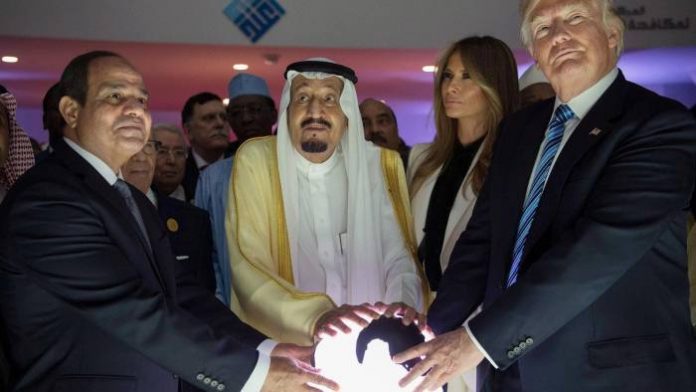Trump’s preference for posturing over policy has given Putin more leverage
Donald Trump’s bluster has done little except backfire in the Middle East. In a region already in flames, his attitude has every chance of lighting new fires. The US under this president is manifestly incapable of using its unique military might to reach the delusional goals he is pursuing — such as eliminating Iran’s influence across the Middle East and even toppling its Shia Islamist regime.
This US preference for posturing over policy has, by default, left Vladimir Putin’s Russia holding the mediation ring in the region. Even if President Putin’s main goal is to preserve his own fragile gains — above all Moscow’s mastery of Syria as a springboard for Russia’s return to the top table of world powers — this presents him with a problem.
To recap: a year ago Mr Trump went to Saudi Arabia and Israel for his first trip abroad as president. In Riyadh, Crown Prince Mohammed bin Salman, the de facto Saudi ruler known as MbS, laid on a roomful of about 50 Arab and African leaders — mostly Sunni despots. Mr Trump called for a Saudi-led Sunni jihad against Shia Iran. The idea was fanciful.
Three years after launching an air war in Yemen, MbS has shown that, whatever it spends on US and British arms, Saudi Arabia cannot defeat rag-tag rebels in the poorest Arab nation, let alone Iran, with the potent paramilitary forces it has nurtured in Iraq, Lebanon, Syria and, indeed, Yemen. Incited by the Riyadh summit, the young crown prince went on to lead a blockade of Qatar, the maverick Gulf emirate, and detain Saad Hariri , prime minister of Lebanon. Both countries have now moved closer to Iran.
One year on, it is not a putative Saudi-led jihad against Iran that is convulsing the region but the real and accelerating possibility of war between Israel and Iran — cheered on, once again, by Mr Trump. Though the Israeli air force has been bombing Iranian and Lebanese Hizbollah targets in Syria for five years, the first direct confrontation between Israel and Iran took place just after the president noisily withdrew from the 2015 nuclear deal Tehran had signed with the US and five other world powers.
Last week, there were at least two more big Israeli air strikes in Syria against Iran/Hizbollah targets. That is the hot potato Mr Putin is holding. Russia is the only power with close links to both Israel and Iran. It was the combination of Russian air power and Iranian paramilitary forces on the ground that saved Syrian president Bashar al-Assad from a Sunni-majority rebellion. Yet Moscow has turned a blind eye to Israel operating in the Syrian airspace that Russia supposedly controls.
If Israel seriously damages the capability of Iran and its allies in Syria, that would kick away the props with which Mr Putin has shored up the Assads. Aside from the fireworks, therefore, there have been stirrings in the diplomatic undergrowth. Mr Putin had meetings in Russia this month with Benjamin Netanyahu, Israel’s prime minister, and Mr Assad. Meanwhile Sergei Lavrov, Russia’s foreign minister, met Mohammad Javad Zarif, his Iranian counterpart.
Israel has long said it will not accept Iran establishing a permanent presence in Syria, or the threat of Hizbollah’s arsenal of Iranian rockets. This month it added it would hit Tehran and its allies in every corner of Syria. Russia appears to have helped negotiate the withdrawal of Iran and proxy forces from the south-west corner of Syria bordering Israel. There are, meanwhile, small signs that France is making headway on resolving the crisis in Yemen, where Iran supports the heterodox Shia Houthi rebels. President Emmanuel Macron has been talking to Mr Putin on a range of Iran-related problems.
This is all very tentative. May has been a dangerous month in the Middle East, during which Mr Trump has helped reignite the Israeli-Palestinian conflict by moving the US embassy in Israel to Jerusalem, the Arab east of which has been illegally occupied by Israel for half a century. Nor should anyone think Mr Putin is a worthy candidate for a Nobel Peace Prize. The master of the Kremlin is acting partly out of frustration that he has not been able to leverage Syria to lift sanctions imposed against Russia; and partly from the realisation that his control of Syria is an illusion.
There is narrow path away from war here and it makes sense to deal with Mr Putin, as Mr Macron is doing. But Mr Trump, with the self-satisfied flourish of the outsize signature he so delights in showing the camera, has largely written the US out of the Middle East script.































